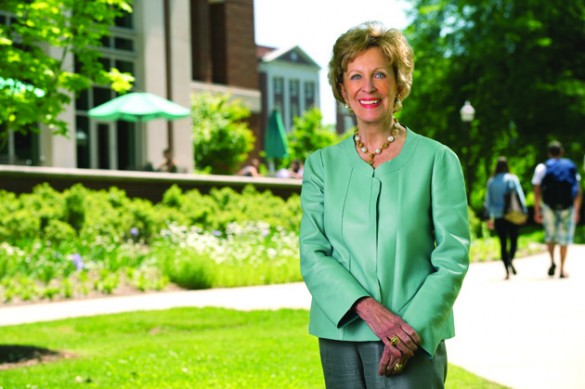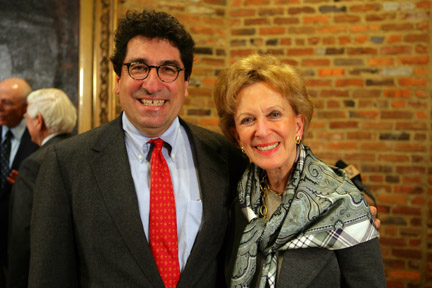Martha R. Ingram provided inspiration and perspiration in launching Vanderbilt’s Commons initiative

It’s a simple vision. The desired outcome of The Commons concept for first-year student life is clear. The execution, however, was one of long, detail-oriented planning. Extensive fundraising. Guts and nerve and stick-to-it-ive-ness.
Those qualities are all evident in Martha R. Ingram, the outgoing chairman of the Vanderbilt Board of Trust and an important force behind The Commons, which is part of the developing College Halls residential system at Vanderbilt.
So it’s appropriate that The Commons is now The Martha Rivers Ingram Commons at Vanderbilt. Ingram was surprised with the news at the April Board of Trust meeting.
The Martha Rivers Ingram Commons is a place where the vast potential of young students is nurtured. It’s a comforting entre into the dizzying life of a student at a competitive international university. And it’s how Vanderbilt seeks to ease the disorientating shuffle of adjustment that is the first-year experience.
Ingram sees it primarily as a place to forge friendships.

“Almost everybody (at The Commons) will have a best friend by the end of their freshman year, if not a whole cadre of best friends,” she said during a recent interview near campus.
“Once they get their bearings, then they can be more productive in their work and social lives. But at the very least they will have a few friends they can turn to by the end of the freshman year and feel like they’re going to be lifelong friends.”
The Commons, and the coming Kissam College Halls, will stand as capstone achievements for Ingram’s 12-year stewardship as Board of Trust chairman, which ends June 30. The Kissam project received the board’s approval at the recent board meeting. Groundbreaking is set for May 2012.
“[rquote]I was not a Vanderbilt graduate,” said Ingram, an alumna of Vassar. “But I feel as if I am one now in many ways.[/rquote]”
The call to be chairman of the Board of Trust surprised Ingram in 1999. Her husband E. Bronson Ingram, who died in 1995, had been a longtime member of the Board of Trust, and some of her children were graduates, but Ingram considered herself “on the periphery” of the university.
Ingram had already distinguished herself as an influential arts philanthropist in Nashville, where she championed the city’s downtown performing arts center and symphony hall, among other endeavors. She also took over running her husband’s Ingram Industries after his death, making her a leader in the inland marine, book and technology distribution industries.
“I was quite startled (to get the invitation to be chairman of the Vanderbilt Board of Trust),” she said. “They’d never had a woman as chairman, much less one who didn’t go to Vanderbilt.”
Despite her trepidations, Ingram felt that her late husband’s affection for and generosity to Vanderbilt merited continued involvement by his family.
“It did take me a few minutes to kind of get my bearings,” she said, “but I soon decided that this was really a fascinating place, and I went about trying to carry on the role as best I could.”
Choosing a Chancellor
Twice Ingram, along with board member Dennis C. Bottorff, has led efforts to find Vanderbilt a new chancellor. She describes it as the most challenging and important task for the board chairman.
The first time they looked outward and nabbed Gordon Gee from Brown. When he left in 2007, they changed strategy and tapped Provost Nicholas S. Zeppos from within.

“In both cases, I really feel we just selected the candidate we felt was the best,” she said.
The weekend after Gee suddenly left for Ohio State after seven years, Zeppos and his wife, Lydia Howarth, coincidentally were already booked to spend some vacation time with Ingram. She received word of Gee’s decision at her vacation home in North Carolina; Zeppos got the news by cell phone in his car on the way.
“I remember she had this quiet confidence about the situation,” Zeppos recalled. “We still had a splendid vacation, because she had decided that the university was going to move forward and even though it was a little bit more on her shoulders, she has this remarkable ability to process what has happened and push ahead.”
Ingram told Zeppos in North Carolina that the interim chancellor position was his, “if you’ll do it.”
“He never missed a beat and carried on for a year while we did the search,” she said.
The final selection of Zeppos was not a given, Ingram stresses. It followed a national search and serious talks with other candidates.
“We put him through the same informal inquisition as people we hardly knew at all,” Ingram said. “And he just came out in a shining light. Nick had already been taking care of a lot of the details while Gordon was out selling which left him fully qualified to carry on.
“[rquote]Nick is going to have a long and wonderful life as chancellor.[/rquote]”
The Origins of College Halls
The germ of the idea that became the College Halls initiative at Vanderbilt was born in the experience of a nervous young freshman newly arrived at Vassar from Charleston, S.C.
“I was from the hinterlands, as far as Vassar (in upstate New York) was concerned,” Ingram said. “I arrived there in my Sunday best suit, a hat that matched, and a purse and gloves.”
She stood out among classmates who dressed in knee socks and Bermuda shorts, even in the dead of winter.
“They were just so nice,” Ingram remembered. “They assured me that I looked ‘wonderful’ but suggested I might be more comfortable in shorts and directed me to the store across the street. I don’t know whatever happened to that suit. It’s probably in the back of the closet, still,” she said with a laugh.
Flash forward to decades later. Ingram is established at the helm at Vanderbilt, but she sees a problem developing.
“It seemed to me that we were reaching out and pulling in more and more students from more and more places – Nebraska, New Mexico, California, everywhere – and less and less of them were coming with a crowd. They were all alone, some away from home for the very first time.”

Ingram wondered how she might feel if she arrived on Vanderbilt’s doorstep as an 18-year-old freshman. She decided that something had to be done to put that anxious teenager at ease.
“You know, change is never easy,” Zeppos said. “I think she tried to imagine a Vanderbilt that would still be Vanderbilt but would take these values of friendship and community and implement them in a new, fresh way. … I’ll never forget her standing up at a board retreat and insisting on the residential college concept. And of course, she’s also made a number of transformational gifts to help make all this happen.”
Stepping Away
Ingram remembers with a chuckle one of her first suggestions to the Board of Trust.
“I looked around the room at a board meeting and there were all these – what looked to me like old people,” she said. “There was no room for young people to come on the board and make their contribution.”
Ingram suggested that at “a certain age,” one should retire from the board to give others a chance.
“And now I am one of those people rotating off,” she said. “You have to be careful what you wish for, because you may get it.”
Ingram plans to take time to travel and golf as she assumes emerita status on the Board of Trust. She continues to be chairman of the Spoleto Festival USA in her hometown of Charleston, where she has pledged to raise half of the $142 million needed for a new performance hall. She’ll continue her work to raise funds for the Nashville Symphony.
And she’ll stop by Vanderbilt once in a while. The Ingram Scholars program founded by her husband continues.
“It’s just fun dealing with the students,” she said. “I’ve really enjoyed the interaction that has come through the Ingram Scholars program. We have the youngsters out for dinner now and then.
“[rquote]I’ll also enjoy talking with the faculty from time to time. And the staff. I’ll miss the wonderful, wonderful people that work here and make the place hum.[/rquote]”
Lasting Leadership
Ingram’s concern for college students doesn’t end with their first-year adjustment. The coming expansion of the College Halls concept to the rest of campus will eventually transform the entire undergraduate experience.
The nervous freshmen who arrive at The Commons will continue to become the leaders of tomorrow, if Vanderbilt works like it should.
But that’s not all.
“I sometimes tell students to make sure they become leaders for good,” Ingram said.
“We have to remember that Hitler and Stalin were leaders, so we need to sort through things and pick out what can lead us to a better world. I know Vanderbilt is teaching its students to do that, and I just hope we keep pushing ourselves to be better.”
Additional photography by Daniel Dubois and Steve Green